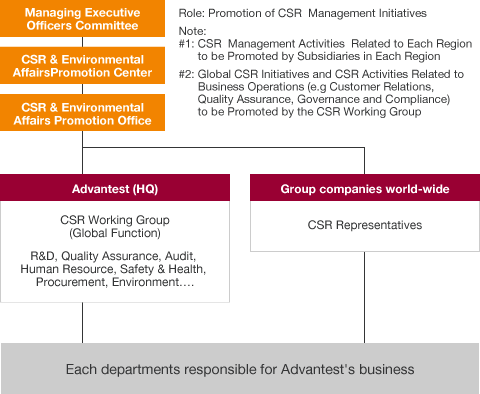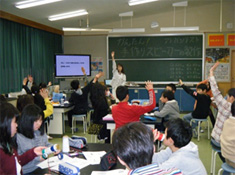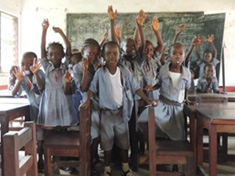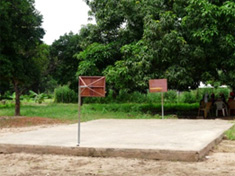 Membership of Civil Society
Membership of Civil Society

Prevention of Bribery and Compliance with the Anti-Monopoly Act
Basic Stance
The basic philosophy of the Advantest Group, which is embodied in the ADVANTEST Way and Code of Conduct, attaches great importance to being aware of one’s responsibilities to society, and to the maintenance of integrity in one’s conduct. Advantest implements a variety of measures to prevent the occurrence of bribery or other corrupt practices, and to prevent anti-competitive behavior.
Prevention of Bribery and Other Corrupt Practices
As a supplement to the Code of Conduct, Advantest has also formulated an Anti-corruption and Anti-bribery Policy, which clarifies, in detail, Advantest’s rules in relation to prevention of bribery and other forms of corruption throughout the world.
To ensure that all Advantest employees fully understand the Policy, and to ensure that they do not engage in behavior that violates law or regulations in any country, all employees throughout the Advantest Group are required to undergo Anti-corruption and Anti-bribery Training on an annual basis.
In fiscal 2015, Advantest was not the subject of any legal action relating to bribery or other corrupt practices.
Compliance with the Anti-Monopoly Act
Advantest educates its employees about all aspects of anti-competitive behavior prevention as part of its Code of Conduct training, with particular emphasis being placed on the need to comply with the Act against Delay in Payment of Subcontract Proceeds, Etc. to Subcontractors; education regarding the Act is provided to new personnel in all relevant departments, including purchasing departments. In the future, Advantest intends to continue providing education and training aimed at ensuring the realization of fair and equitable transactions. In addition, Advantest’s Internal Auditing Department undertakes sampling of purchasing transaction content, to verify that there are no violations of any kind.
In fiscal 2015, Advantest was not the subject of any legal action relating to bribery or other corrupt practices.
Social Contribution Activities
Stance towards social contribution activities
Advantest’s Corporate Social Responsibility (CSR) Policy was stipulated as follows in April 2008: “Advantest respects each of its stakeholders and strives to maintain harmony with society in all its operations while contributing to the goal of a sustainable society.” Based on this stance, Advantest conducts social contribution activities focused on the areas of preserving the global environment, developing the next generation, and contributing to local communities.
Advantest seeks to respond to the needs of its stakeholders and the community in order to contribute to the development of an affluent society through its social contribution activities, thereby fulfilling its corporate social responsibility as a global company.
Advantest’s Organization for Promoting CSR
Advantest has a track record of promoting CSR and environmental initiatives in every country and region it operates in, especially Japan. However, it has been increasingly important for Advantest to conduct more global CSR and environmental initiatives through its supply chain as a company that contributes to a broader range of societies. We intend to continue contributing to regional societies through our CSR and environmental initiatives.
Advantest’s Organization for Promoting CSR

Framework to Promote Employee Participation
At Advantest we are actively promoting employee participation in volunteer activities.
Volunteer activities provide a way to contribute to society, and we recruit participants through our intranet. We also include reports on activities in each region and participants’ views in our internal newsletter which contributes to attracting new participants.
Employees can save up their unused holidays that would otherwise not be transferred to the next year and use them for volunteer activities.
Examples of Social Contribution Activities in fiscal 2015
Contribution to local community through food donation
On 15th January 2016, as part of their “3R* activities”, Advantest (Singapore) Pte. Ltd. (ASP), in collaboration with the charity “Singapore Children’s Society Family Service Centre”, distributed food to poor families in a district near ASP’s office. Prior to the donation, US$3,750 was raised through employee donations and a charity auction of items brought in by employees and items (including drawstring bags and coasters) made by employees using recycled materials. On the day of the food donation, employees bought food at the local supermarket, separated and packaged it, and delivered 270 bags in 90 sets to families.
* 3R: Reduce, Reuse, Recycle
Onsite Science Lesson for Elementary Schools
Advantest conducts onsite science lessons for elementary school students for the purpose of communicating the fun of our main characteristic (the fun of manufacturing) to children.
On February 25, 2016, a group of seven Advantest employee volunteers visited Nachigaoka Elementary School, Natori, Miyagi Prefecture, where they helped a group of 34 5th-grade students to create hand-made speakers. The children listed enthusiastically as the volunteer instructors explained how the principles of magnetism that the children had studied in science class could be used to create hand-made speakers. The teaching materials had been improved so that the speakers would produce an unprecedentedly loud sound; the children’s applause at the end of the class was just as loud.
Germany and Gambia: Project Involving Management of a Nursery School
Advantest Europe GmbH and the Bee Tillo e.V. private charity organization founded by Advantest employees have been providing support for the construction and operation of a nursery school in Tungina, Gambia. The nursery school, which is attended by approximately 90 children aged between 3 and 7, opened in September 2013. The three teachers working at the nursery school are all studying to obtain university-level qualifications in preschool education, with financial support from Bee Tillo e.V.
In 2015 a new water supply was installed for the school’s toilets, and the school grounds were expanded with the addition of a basketball court. The cultivation of bananas and other fruit on school grounds has also begun, partly to facilitate science education and also to provide an additional source of funding for the nursery school.






